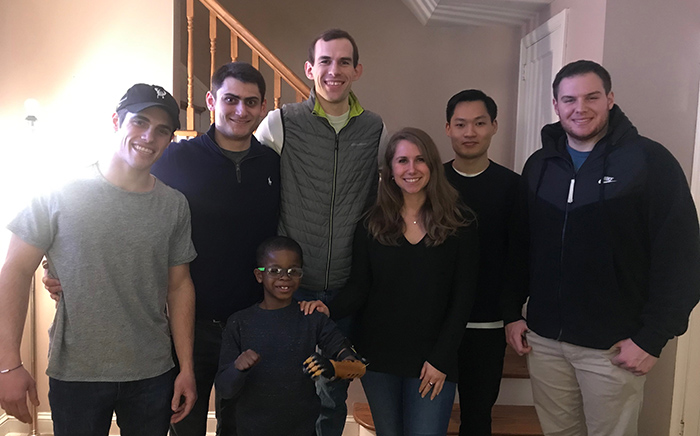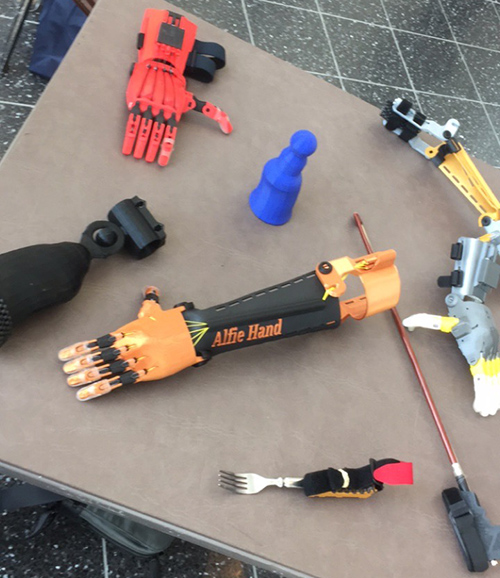The Human Aspect of Medicine: Drexel Dragon Claws
By Catherine McCorkle
Dragon Claws is serious about service. In just a few years, the graduate student group grew from four guys with a 3D printer to a sanctioned Drexel organization directly impacting young people and families in the Greater Philadelphia region. Former members of the club’s leadership Steven DiStefano, Gabe Pertierra and Brittany Smith (all members of the Biomedical Science program Class of 2020) attest that the hours of work involved are not only rewarding; they enhance the graduate school experience as well.
Their mission? To provide free, task-specific prosthetic devices to local children. It began with a small group of students in 2017. “They got their hands on a 3D printer, and they were doing amazing things,” Pertierra says. Those students worked to have their group certified by e-NABLE, a global community of volunteers creating 3D-printed upper-limb prostheses. DiStefano, Pertierra and Smith didn’t start Dragon Claws, but they engineered its growth. They’re quick to point to the founders as exemplary, inspirational role models. They are thrilled to have the opportunity to continue what the founders began and to impact the community.

A client named Isaiah, with members of Drexel Dragon Claws (left to right) Gabe Pertierra, Steven DiStefano, Tyler Bogaczyk (MS Biomedical Studies ‘19), Brittany Smith, current Interdisciplinary Health Sciences student Edward Han, and Anthony Cappellino (MS Biomedical Studies ‘20).
The devices they make depend on the client. “If the client says, ‘I need x, y and z,’” Smith explains, “we will work around the clock trying to figure out how we can do that. We’ve spent many hours sitting in a room, drawing on whiteboards, trying to work something out. It’s a good time.”
Describing a device he and DiStefano made for a child missing part of one arm, Pertierra says, “Riding a bike with one hand is very difficult. So we built an extension that was the size of the child’s limb. It fit just snugly enough so that, if he fell, he could bail out of it. We had to think of so many different things. There’s no blueprint for this. Steve and I spent hours doing a prototype, but it was well worth it.”
BROADENING THEIR REACH
As group membership and clients increased, they adapted. Dragon Claws began using social media (in addition to the e-NABLE database) to connect with potential clients. The cost of the materials (printer maintenance, filament, any necessary tools) “was all out of our own pockets,” says Pertierra, “which was okay when the printer was small and we had a small number of clients.” Smith turned to fundraising, using GoFundMe to further their work, “once we had more members, more demands, and we needed new printers.”
The leadership of the MS in Biomedical Science program was supportive of the group’s goals. The program requires students to volunteer in the community through a service project. “They allowed students to volunteer with us and count those hours even before we were a sanctioned club. They made us better,” Pertierra observes, specifically citing the support of their advisor, Monika Jost, PhD, director, Division of Pre-medical and Pre-health Programs. Smith and DiStefano also began the process of establishing Dragon Claws as an official Drexel organization, presenting to the Graduate Student Association Board in early 2020.
The benefits of becoming a sanctioned organization were clear, DiStefano explains. An official group would have access to extra resources and much-needed funding. Additionally, they’d be guaranteed a dedicated workspace. Until this point, Tina Ross, co-director of the Master of Science in Forensic Science program, was generously letting the group use her lab as a workspace and to house their printers.

A sampling of the devices that Drexel Dragon Claws has made for their clients. The red hand, a “wrist-powered” hand, was printed to get Drexel Dragon Claws e-NABLE certified. The blue ball-and-socket device is a draft for a bike-riding prosthesis for a client. The black and orange hand, known as an “Alfie hand,” is a scaled-up version of the hand that Isaiah uses. The device with a fork was designed to increase independence for an adult double amputee. The violin bow was designed for a young boy who wished to play the violin.
REAL-WORLD IMPACTS
Yet throughout this process — fundraising, publicizing, getting the club sanctioned, working with clients, and grad school — DiStefano, Pertierra and Smith all stress that helping kids in need of assistive devices made the work more than worth it. “I absolutely loved the interaction with our clients,” says Smith. “Many volunteer opportunities presented to us were ‘one-and-done.’ You went, you did your service, you checked that box, and then you left. I think most of us wanted to impact the people we were working with instead of just putting a Band-Aid on it.”
“That’s what made Dragon Claws stand out as opposed to any other volunteer opportunity,” Pertierra echoes. “I don’t think any of us discounts the impact we were able to have on our clients. That was so personal … so humbling.”
One of their first classes in graduate school focused on the human aspect of medicine, “the part that’s not science-based or health-based,” DiStefano observes. He says that working with Dragon Claws, keeping that human aspect in focus, “makes everything else seem much more manageable and enjoyable.” Smith shares an experience that seems to embody how they all feel about Dragon Claws and how it in turn has impacted them.
They’d made a prosthetic arm for a 7-year-old boy, and after visiting him and his family for several hours, needed to take the arm back to campus to make the necessary adjustments. Smith recalls approaching the boy, saying, “‘Okay, I’m just going to take this off, and I’ll bring it back in a couple of months.’ I didn’t get halfway through my sentence when he looks at me and clutches his arm against himself, saying ‘You’re not going to take it, right?’ In that moment, Smith realized she couldn’t take the prosthetic from the boy even though the team need to make adjustments. “We’re going to print another,” she said, leaving him with the arm.
She says that returning to campus after hours with the family, and now with several hours of new work ahead of them, “We should’ve been exhausted. We should’ve been stressed about studying. But we were just all smiles the entire way home. It was such a light in our lives and in our week. It’s hard to remember that connection sometimes when you’re sitting in class, but this is truly why we want to do medicine.”
Gabe Pertierra is now attending medical school at Drexel. Steven DiStefano is at Philadelphia College of Osteopathic Medicine. Brittany Smith attends Campbell University School of Osteopathic Medicine.
Back to Top